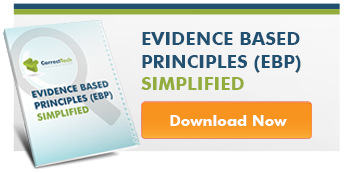Adapting CBT for Justice-Involved Clients - Check out the Blog Series!
Posted by Raymond Chip Tafrate, PhD, Damon Mitchell, PhD, & David J. Simourd, PhD on 3/13/20 6:00 AM
Topics: Assessment, Community Corrections Professional, Addiction, Relapse Prevention, client development, Developing a practice model, coaching community corrections clients, reentry, client needs and values, risk, EBP, Justice-Involved Clients, jic
How Full is Your Bucket?
Posted by Lisa Sayler on 12/6/19 12:24 PM
“I don’t get a candy bar every time I do my job, why should a client get something for doing what they are already supposed to do?” Have you ever thought or heard something like this when discussing positive reinforcement with clients in community corrections? When research shows positive reinforcement is more effective in long term behavior change, why is it that we tend to default to punish only?
In my experience managing clients, managing staff, being a mother, wife, mentor and coach, I can attest that it can be easier to sigh, moan and complain about the performance of others. Every time I find myself pulling out my hair, I realize I haven’t been using one of my best tools, positive reinforcement. And guess what, when I start using it (or increase my use of it), I see improvement and I feel happier. It is all too easy to only notice what is going wrong and completely pay no attention to what is going right.
Let me offer some tips for success when implementing a positive reinforcement program in your agency.
Read MoreTopics: Community Corrections, Evidence Based Practices, Positive Reinforcement, Community Corrections Professional, client development, reentry, EBP, Justice-Involved Clients
Understanding Risk: A Personal Experiment
Posted by Raymond Chip Tafrate, PhD, Damon Mitchell, PhD, & David J. Simourd, PhD on 10/4/19 1:55 PM
There is an interesting contradiction in the scientific research of justice-involved clients (JICs) as it relates to mental health. First, JICs tend to have a relatively high prevalence of mental health problems. Second, mental health symptoms among JICs are actually weakly related to criminality (i.e., poor predictors of recidivism). Although there are certainly individual cases in which a JIC’s mental health symptoms directly influenced their offending behavior, these are infrequent occurrences. For the majority of cases, criminal risk domains (discussed in our previous blogs) and not mental health symptoms drive criminal behavior. This concept is particularly important in terms of intervention.
Read MoreTopics: client development, client needs and values, high risk client, EBP
The Coaching Habit of Creating Focus
Posted by Evan C. Crist, Psy.D. on 8/14/18 11:44 AM
After cutting through the fog of small talk and vague concerns with the Kickstart Question and a series of And What Else? questions, you have narrowed the focus. Perfect. Time to fix it, right? Wrong. It is time to slow down your urge to believe your brain that you know the problem and have the solution. Narrowing the focus is different than specifically defining the problem. You are getting closer but aren’t there yet.
The third question in Michael Bungay Stanier’s The Coaching Habit: Say Less, Ask More and Change the Way You Lead Forever is the Focus Question. “What’s the real challenge here for you?” We’ve addressed the danger of the Advice Monster in a previous blog and it is most likely to attempt to take over the discussion here. Your frontal lobe is now convinced it fully understands the issue and the advice monster is eager to do its bidding. The Advice Monster impulsively disagrees with a basic tenet of therapeutic intervention; It is our job to expose the client’s values and desires, not to impose our values and desires. Unsolicited advice is an attempt to impose our values on a client. You are in good company. We all have that urge. Instead, let’s find out what the real challenge is for them at this moment.
Read MoreTopics: client development, The Coaching Habit, Evan C. Crist, coaching community corrections clients, client needs and values, the awe question
Put a Coaching Habit at the Heart of your Practice Model
Posted by Evan C. Crist, Psy.D. on 6/29/18 7:18 AM
When considering where to start formulating a practice model, I happened upon The Coaching Habit: Say Less, Ask More and Change the Way You Lead Forever. I love the title. It is so packed full of important concepts; coaching, habits, listening, asking, changing you, leadership and the future. Wow, if that’s the title, imagine all of the ideas covered in this brilliantly simple book by Michael Bungay Stanier. While in the past I’ve questioned the actual importance of coaching vs. the rise of the rhetoric and number of coaching books, after reading this book I am a believer. If you read one book about coaching, make it this one.
Read MoreTopics: Motivational Interviewing, client development, Listening Skills, The Coaching Habit, Michael Bungay Stanier, Community Corrections Client Services
Subscribe To Our Blog
Recent Posts
Posts by Topic
- Community Corrections (63)
- Evidence Based Practices (44)
- Community Corrections Professional (23)
- Software (15)
- Practices (12)
- Change (11)
- Technology (10)
- Risk Principle (8)
- reentry (8)
- probation staff (7)
- EBP (6)
- Outcomes (6)
- client development (6)
- client needs and values (6)
- coaching community corrections clients (6)
- Assessment (5)
- Community (5)
- Developing a practice model (5)
- Justice-Involved Clients (5)
- Remote work (5)
- The Coaching Habit (5)
- parole (5)
- risk (5)
- tele-supervision (5)
- tele-work (5)
- Community Engagement (4)
- Evan C. Crist (4)
- Community Corrections Client Services (3)
- Criminal Justice Reform (3)
- Implementation (3)
- Listening Skills (3)
- Motivational Interviewing (3)
- Policy (3)
- Positive Reinforcement (3)
- Practice Models (3)
- high risk client (3)
- reaching clients emotions (3)
- responsivity (3)
- Addiction (2)
- BOP (2)
- Conferences (2)
- ICCA (2)
- Management (2)
- Michael Bungay Stanier (2)
- Relapse Prevention (2)
- halfway house (2)
- jic (2)
- paperless office (2)
- principles (2)
- procedures (2)
- program results (2)
- APPA (1)
- Appreciative Thinking (1)
- Brian Lovins (1)
- COVID-10 (1)
- Community Connection (1)
- Coronavirus (1)
- Crisis (1)
- Customer Service (1)
- Data Management (1)
- Fidelity (1)
- ICCA Seattle (1)
- Juvenile Corrections (1)
- Leadership (1)
- Monitor History (1)
- Opioid Addiction (1)
- Opioid Crisis (1)
- Orange is the New Black (1)
- Program Data (1)
- Reforms (1)
- Relapse (1)
- Second Chances (1)
- Switch by the Heath Brothers (1)
- Treatment (1)
- drug testing (1)
- going paperless (1)
- govcio outlook (1)
- impact sessions (1)
- innovation (1)
- intrinsic motivation (1)
- justice reinvestment (1)
- marijuana testing (1)
- money savings (1)
- opiod testing (1)
- purpose (1)
- remote working (1)
- resources (1)
- sanction (1)
- staff productivity (1)
- technology solutions provider (1)
- the awe question (1)
- what works (1)
- what's on your heart (1)
- work from home (1)







